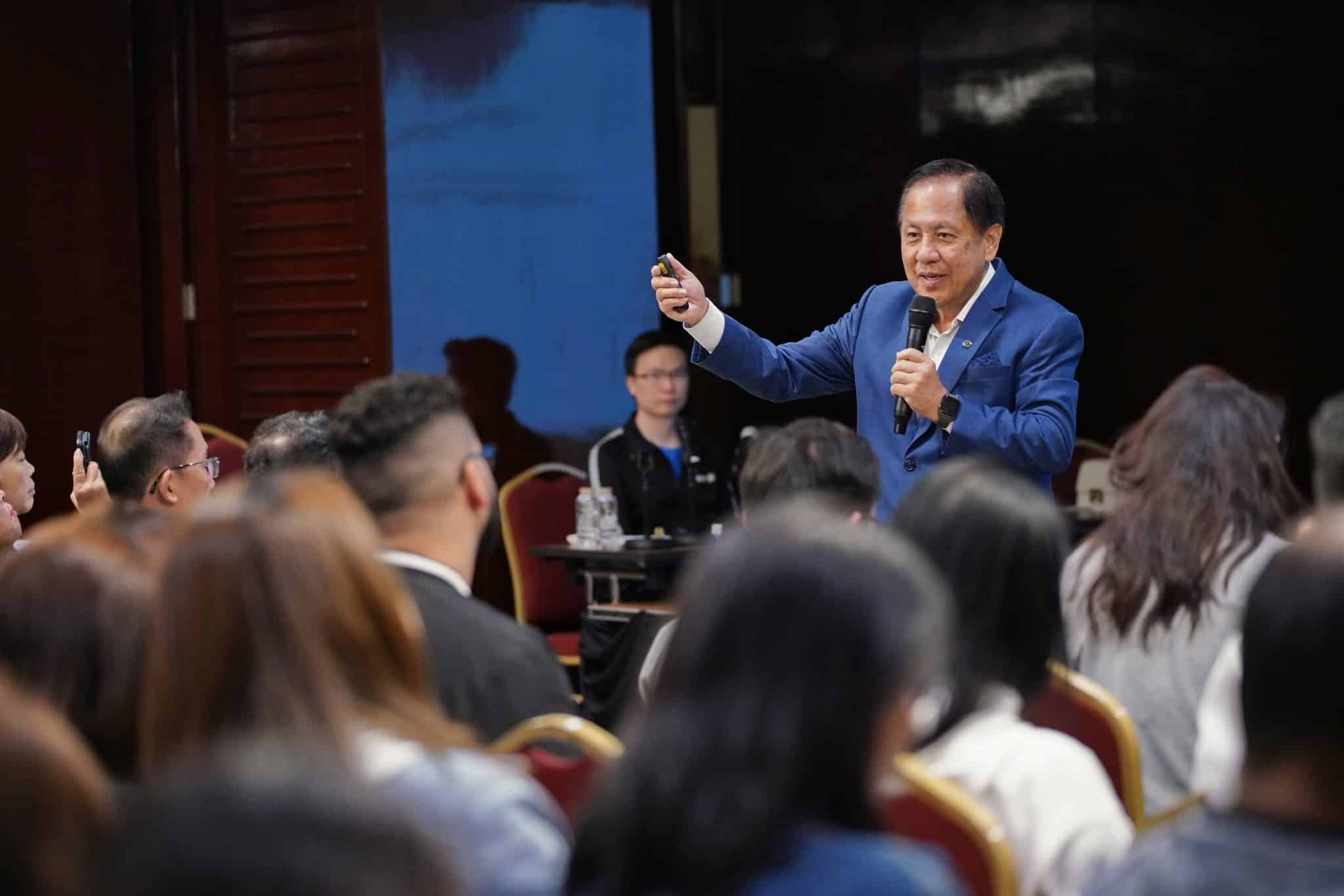Are you willing to fail well? BGST principal Lai Pak-Wah shares 6 lessons he learnt on leadership
Lai Pak-Wah // January 3, 2023, 6:36 pm

"To embrace leadership is to embrace more opportunities to be tested," notes Lai Pak-Wah, principal of BGST. Are we willing? Photo courtesy of Lai Pak-Wah.
Three-and-a-half years ago, I became principal of a theological school. I didn’t know how others prepared themselves as leaders. As a theologian, I started with what I was comfortable with – reading books, this time on leadership.
This also coincided with BGST developing our ENGAGE Certificates in Leadership, where we hybridised contemporary leadership frameworks and practices with theological reflections and spiritual formation practices.
An analogy of my leadership was a constant spinning of plates on sticks while trying to manage my emotional chaos.
The first two years were chaotic days when I struggled to ascertain what is leadership. (I’m not sure whether it is comforting to know that experts are still debating its definitions!)
It also dawned on me that most progress in their leadership through stages – from self, to interpersonal, to team, functional and then finally organisational leadership. This takes years, even decades.
In my case, however, I had suddenly leap-frogged from self to organisational leadership in just two years. This explained the chaos I struggled with each day. It was a bit like back to our GCE ‘O’ level days, when we had to decide which of the 8-9 subjects we had to study first.
In this case, however, it was figuring which to tackle and prioritise: Strategy, governance, operations, finance, teaching and content development, IT, HR, fund-raising and so on. The prevailing analogy was a constant spinning of plates on sticks … all the while trying to manage my emotional chaos – a sense of inadequacy, sometimes anger, sometimes depression.
So, after 3.5 years, where am I now?
As the year ends and a new one begins, I thought it helpful to summarise a few lessons I have come to appreciate and am still learning.
Some of these insights may change in the years to come. I may even disagree with my old self. But that is for me to find out in the future. Here goes:
1. Leadership as Personality Driven
During my first two years, I underwent a whole host of psychometric profiling tools – DISC, MBTI, Enneagram, Gallup, Belbin, and Fingerprint for Success.
Whether I like it or not, who I am defines how I lead. I need to be comfortable to lead out of that, warts and all.
The key insight that I received is that our personalities, training and life experience shape the way we lead.
I like to work with new ideas, integrate them and cast a vision to help others chart the way ahead. I have a high-risk appetite, and can be disruptive in my ways. I am also bad at details and underdeveloped in my EQ and need help to avoid hurting others.
Whether I like it or not, who I am defines how I lead.
I need to be comfortable to lead out of that, warts and all, and not hope to become the other kind of leaders which I am not.
The corollary is this: My strengths have dark sides. I can overplay them and these are the areas which I fall or sin most often.
For example, I have started too many initiatives which never materialise because I do not know how to moderate these ideas or have the wisdom to look for others to implement them well.
2. Leadership as Teaming
This brings us to my next point: We only flourish in teams. Because I am incomplete, I need to lean on others to achieve goals and to excel.
Yes, I may be prone to developing new ideas and initiatives, but it takes a good implementor and detailed person to take the vision to reality, without which, the initiatives would only be vanity.
For this reason, developing a well-balanced team is absolutely essential.
3. Leadership as Contextual
Our personalities, training and experience mean that we will lead well in some organisations and contexts, and not so well in others.
Likewise, we naturally lead some people well, and not others, particularly those who are polar opposites from us.
The latter, I suspect, will change as we gain experience in leadership and our ability to manage a wider range of people.
4. Leadership and Frameworks
Notwithstanding my training as a theologian, I believe that any leadership theory worth its salt must be balanced by a healthy dose of operational tools and implementation frameworks, without which we cannot lead practically.
For instance, we may believe that teamwork is good for any organisation, but the ability to foster teamwork still requires frameworks and tools to navigate our daily work.
5. Leadership as Virtuous
While there are different kinds of leaders, I am convinced that all leaders must have certain attributes or virtues.
This is the realm of self-leadership. This becomes even more essential as our leadership responsibilities stack up and our challenges become more complex.
The leadership virtues are love, courage, humility, faith and wisdom. Underlying all these is the ability to practise spiritual freedom.
i. Love
Leaders must love those they lead. I know I have often failed in this area. But we must strive.
As leaders, we are called to be courageous to deal with issues. If not, it is better for us not to lead and stand down.
By love, I mean caring for their development, that they have enough rest. That they enjoy their work and colleagues. And that the obstacles to their work are removed.
Practically speaking, this often requires us to clarify roles and duties at work. Who does one report to, what is the scope of an employee’s work. This is where I made most of my grave mistakes.
This clarity, however, is absolutely important. Left unresolved, it leads to organisational conflicts, stress and burnout.
I would say that a leader’s commitment to love is benchmarked by the extent he is willing to deal with the issues with regards to job clarity and responsibilities.
Say what you may about staff welfare, if we don’t sort out clarity, no amount of welfare will help our employees to flourish.
ii. Courage
To implement clarity at work, to guide others, we need the courage to overcome our aversion to conflict. Every time we avoid difficult conversations, or avoid calling out the elephant in the room, the problem usually rots. It festers. It creates a toxic work environment.
Courage is needed to take a stand for what we believe is for the welfare of the whole organisation.
This means knowing when not to change our minds because we are afraid of certain personalities or trying to please others. This is hardly easy.
It is also learning to make difficult or complex decisions which some of our staff and peers may not understand, while knowing that we will be misunderstood. We will be criticised. And sometimes, we will even get things wrong!
iii. Faith and wisdom
Courage alone may just be stubbornness or pride or inflexibility.
For this reason, it must be practised with faith – a trust that God will lead and guide despite the difficult decisions to make. And the wisdom to discern whether our courage is a masquerade for pride, or truly taking a stand for the common good.
iv. Humility
Humility is the willingness to be corrected. To seek and listen to the advice of others. To be prepared that I could be wrong. To apologise to others. Without this, wisdom cannot operate, because we will constantly be misled by our pride, anger, or insecurities.
Humility is thus grounds for developing our self-awareness and watchfulness over our inner life.
Humility is also an important safeguard against taking the credit of others; it is being able to give credit to the team.
For this is what Christian leadership entails: To die to ourselves so that others may be esteemed and affirmed for their work well done.
v. Spiritual Freedom
Undergirding all these is spiritual freedom, a recognition that we are loved by Christ and we have nothing to prove to ourselves or others in our leadership. We do not draw our significance from it. Indeed, we can walk away from it any time!
Only then will we not be misled by our pride and insecurities. We can practise wisdom properly. We can be courageous to make the difficult decisions, to love and to do what’s necessary for the flourishing of the organisation that God has called us to steward.
6. Leadership and grace
To embrace leadership is to embrace more opportunities to be tested.
To embrace leadership is to embrace more opportunities to be tested. Circumstances and trials are what shape our character.
Circumstances and trials are what shape our character.
This means that, before the perfection comes, we shall sin lots.
In his treatise On the Priesthood, John Chrysostom makes a sober observation that many Christian monks can only be holy on their own, but will unravel and sin when put into leadership positions.
This is certainly my experience. I have sinned more than when I was just a lecturer. I have offended others more, and made wrong decisions more after becoming a leader.
That’s because my character and maturity have not caught up with the stress-testing.
Good leadership is a sweet offering we can present to God.
This is why underpinning our leadership, there must always be a deep sense and sweet assurance of God’s sustaining grace – that He loves us, He has forgiven us in Christ, and that we can stand up when we fall and to keep going. To persevere.
That’s because we are deeply loved regardless of our leadership ability.
Ultimately, good leadership is a sweet offering we can present to God. The fact of the matter is that good leaders are rare. So, for those willing to steward our talents and train ourselves to lead well, to lead freely in Christ, this certainly will contribute to the flourishing of His kingdom.
As Peter Drucker sharply observes, we know leadership is missing whenever an organisation is in chaos.
May we be willing to be shaped as God’s instruments of peace and grace to help lessen some of the chaos!
First published by Lai Pak-Wah on Facebook based on his reflections of BGST’s ENGAGE leadership programmes. Find out more here.
FOR MORE ARTICLES ON LEADERSHIP:
We are an independent, non-profit organisation that relies on the generosity of our readers, such as yourself, to continue serving the kingdom. Every dollar donated goes directly back into our editorial coverage.
Would you consider partnering with us in our kingdom work by supporting us financially, either as a one-off donation, or a recurring pledge?
Support Salt&Light




